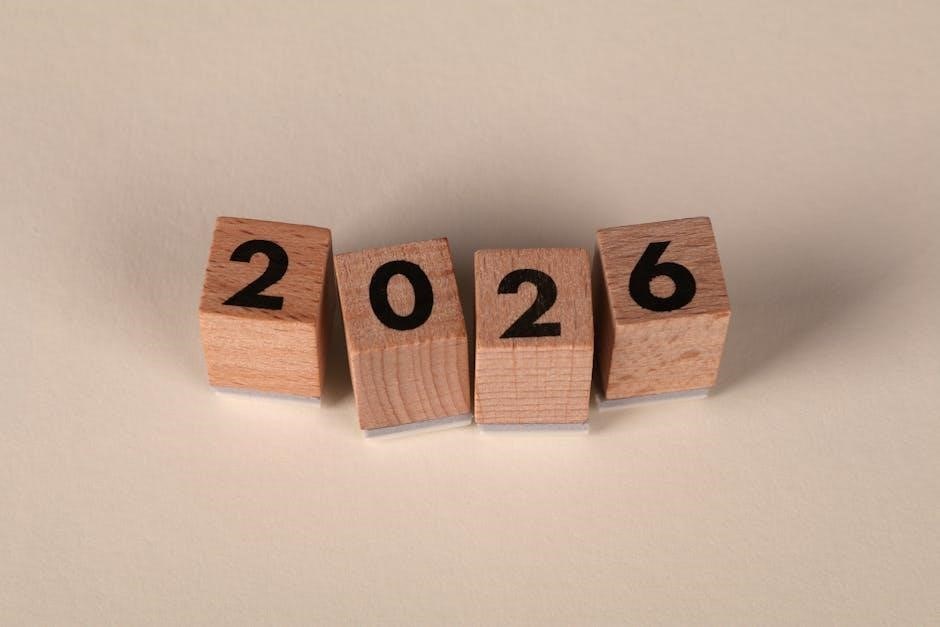Overview of Year 7 Maths Curriculum
The Year 7 Maths curriculum is designed to build foundational skills in number operations, algebra, geometry, data handling, and problem-solving. It emphasizes real-world applications and critical thinking, preparing students for advanced studies.
1.1 Key Topics Covered in Year 7 Maths
The Year 7 Maths curriculum covers essential topics such as integers, sequences, and expressions. Students explore place value, decimals, and fractions, including simplification and equivalence. Geometry topics include angles, symmetry, and basic constructions. Data handling introduces averages, probability, and interpreting graphs. Problem-solving and critical thinking are integrated throughout, with a focus on real-world applications. These topics build a strong foundation for future maths studies, fostering analytical and logical reasoning skills.
1.2 Importance of Year 7 Maths in the Overall Curriculum
Year 7 Maths is crucial as it lays the foundation for higher-level mathematics; It develops essential skills in problem-solving, logical reasoning, and critical thinking. These skills are vital for success in STEM subjects and real-world applications. The curriculum introduces key concepts that build upon primary maths, ensuring a smooth transition to more complex topics. By mastering Year 7 Maths, students gain confidence and a solid understanding necessary for future academic challenges and lifelong learning. It also fosters analytical skills, enabling students to approach problems methodically and creatively.

Structure of the Year 7 Maths Textbook
The Year 7 Maths textbook is organized into 19 units, each focusing on key areas like Number, Geometry, Algebra, and Data Handling. Units include introductions, exercises, and summary boxes to reinforce learning and provide clear structure for students.
2.1 Layout and Organization of the Textbook
The Year 7 Maths textbook is structured logically, divided into 19 units that cover essential mathematical areas. Each unit begins with an introduction listing key terms and concepts, followed by topic-specific sections. Topics include worked examples, exercises, and helpful hints in blue boxes to guide students. The textbook also features problem-solving symbols to highlight critical thinking questions. Visual aids like diagrams and graphs are used extensively to illustrate complex ideas. At the end of each unit, a summary box reinforces learning, and review exercises test understanding. This clear organization helps students navigate the content seamlessly.
2.2 Key Features of the Textbook (Units, Topics, Exercises)
The textbook is divided into 19 units, each focusing on a specific area of mathematics. Units are further broken down into topics, each offering clear explanations and examples. Exercises are provided at the end of each topic to reinforce learning. Additionally, review exercises at the end of each unit help assess understanding. Special symbols highlight problem-solving questions, encouraging critical thinking. The textbook also includes a glossary for quick reference, ensuring students can easily review key terms and concepts throughout their studies.

Core Content Areas in Year 7 Maths
Year 7 Maths focuses on number, algebra, geometry, data handling, and problem-solving, building essential skills for real-world applications and future academic success.
3.1 Number and Operations
In Year 7 Maths, the study of number and operations involves understanding integers, decimals, and percentages. Students learn to perform calculations involving addition, subtraction, multiplication, and division with these numbers. They also explore concepts such as negative numbers, prime numbers, and square roots. Practical applications include solving word problems and estimating quantities. This foundational knowledge is crucial for more advanced mathematical concepts in later years.
3.2 Algebra and Expressions
In Year 7 Maths, algebra and expressions introduce students to working with variables and formulas. Key topics include simplifying expressions, constructing algebraic expressions, and solving linear equations. Students learn to identify patterns, generate sequences, and apply algebraic methods to real-world problems. The curriculum emphasizes understanding how to manipulate and interpret expressions, ensuring a strong foundation for advanced algebraic concepts in later years. Practical exercises and problem-solving activities help students develop logical thinking and mathematical reasoning skills. This section is essential for building a solid algebraic understanding.
3.3 Geometry and Measurement
In Year 7 Maths, geometry and measurement focus on understanding shapes, angles, and spatial relationships. Students learn to calculate perimeter, area, and volume, and explore properties of 2D and 3D shapes. Key topics include labelling angles, identifying symmetry, and measuring length, mass, and capacity. Practical exercises involve drawing and measuring shapes, and solving real-world problems involving distance and scale. This section develops spatial awareness and applies mathematical concepts to everyday situations, enhancing problem-solving abilities.
3.4 Handling Data and Statistics
In Year 7 Maths, handling data and statistics involves collecting, organizing, and interpreting information. Students learn to create and analyze frequency tables, bar charts, and pie charts. Key topics include planning data collection, identifying patterns, and calculating averages and range. Exercises focus on real-world applications, such as interpreting test results or survey data. This section develops analytical skills and the ability to draw conclusions from data, preparing students to make informed decisions in everyday situations. Practical problems enhance understanding of statistical concepts and their relevance to real life.
3.5 Problem Solving and Critical Thinking
Problem solving and critical thinking are essential skills in Year 7 Maths, focusing on applying mathematical knowledge to real-world scenarios. Students learn to break down complex problems, identify patterns, and develop logical reasoning. Activities include solving multi-step problems, interpreting data, and justifying solutions. Peer discussions and collaborative tasks encourage deeper understanding and creative approaches. This section emphasizes the importance of precision, accuracy, and presenting solutions clearly. By mastering these skills, students build confidence in tackling challenges and develop a systematic approach to problem-solving. Critical thinking is integrated throughout the curriculum to foster independent learners.

Popular Year 7 Maths Textbooks
Popular Year 7 Maths textbooks include Oxford Mathematics, Heinemann Maths, and Collins Connect. These resources offer comprehensive coverage, interactive features, and are widely available in PDF formats for easy access.
4.1 Cambridge Checkpoint Mathematics
The Cambridge Checkpoint Mathematics series is a widely used resource for Year 7 students, offering a structured approach to mastering foundational maths skills. This textbook is part of a three-stage curriculum, with Stage 7 focusing on Number, Algebra, Geometry, Handling Data, and Problem Solving. It features 19 units, each with clear introductions, key terms, and practical exercises. The book includes worked examples, helpful hints, and review sections to reinforce learning. Available in PDF format, it provides flexibility for digital learners while maintaining the quality of traditional textbooks.
4.2 Other Recommended Textbooks
Besides Cambridge Checkpoint, other recommended textbooks for Year 7 Maths include resources like Maths Frameworking and Problem-Solving Strategies and Directed Numbers. These texts offer interactive activities, worksheets, and extension challenges to enhance learning. They focus on real-world applications, making maths relatable and engaging. Many of these textbooks are available in PDF format, providing easy access for digital learners. They also include revision tips, animated lessons, and comprehensive guides to support students in mastering key concepts and improving their problem-solving skills.

Resources and Study Materials
Year 7 Maths students benefit from worksheets, animated lessons, and revision guides. These resources, often available in PDF format, provide interactive learning experiences and comprehensive study support.
5.1 Worksheets and Activities
Worksheets and activities are essential for reinforcing Year 7 Maths concepts. They include targeted exercises, puzzles, and extension challenges, allowing students to practice and apply their knowledge effectively. These resources often align with textbook content, ensuring a comprehensive learning experience. Activities are designed to engage students and make maths enjoyable. By using these materials, students can identify areas needing improvement and build confidence in their problem-solving abilities. Regular use of worksheets and activities supports consistent progress and better understanding of key topics.
5.2 Animated and Video Lessons
Animated and video lessons provide an engaging way to learn Year 7 Maths concepts. These resources use visual demonstrations to explain topics like fractions, geometry, and algebra. Videos often include step-by-step explanations, making complex ideas easier to understand. They can be paused, replayed, and reviewed, offering flexibility for students to learn at their own pace. Interactive elements in some videos enhance engagement, while real-world examples help students connect maths to practical scenarios. These lessons are a valuable supplement to textbook learning, supporting visual and auditory learners effectively.
5.3 Revision Tips and Guides
Effective revision is crucial for mastering Year 7 Maths. Students should create a study schedule, focusing on weak areas and using past papers for practice. Understanding mistakes is key; reviewing incorrect answers helps clarify concepts. Utilize revision guides, fact sheets, and online resources for targeted practice. Teaching concepts to others or explaining them aloud can deepen understanding. Regular breaks and active learning techniques, like solving problems aloud or using real-world examples, keep revision engaging. Consistent practice builds confidence and fluency in maths skills.

Year 7 Maths Textbook PDF Availability
Year 7 Maths PDFs are available on platforms like AnyFlip and archive.org, offering convenient access to entire textbooks with interactive features like video lessons and worksheets included.
6.1 Where to Find Year 7 Maths Textbooks in PDF Format
Year 7 Maths textbooks in PDF format are available on platforms like AnyFlip, archive.org, and educational websites. Websites such as Cambridge University Press offer digital versions of popular textbooks, including the Cambridge Checkpoint Mathematics series. These PDFs are often free or require a subscription and provide access to complete textbooks, including exercises, worked examples, and revision guides. They are ideal for students seeking flexible learning resources and can be downloaded for offline use, ensuring easy access to study materials anytime, anywhere.
6.2 Benefits and Drawbacks of Using PDF Textbooks
PDF textbooks offer convenience and accessibility, allowing students to study on multiple devices. They are often cost-effective and environmentally friendly, reducing the need for physical copies. However, PDFs can cause eye strain and lack interactive features. Additionally, some PDFs may be copyrighted, limiting legal sharing. Despite these drawbacks, they remain a popular choice for flexible learning, especially for revising key topics like number operations and geometry.

Additional Support and Tools
Online platforms like Khan Academy and BBC Bitesize offer video lessons, interactive exercises, and revision guides to complement Year 7 Maths studies, enhancing understanding and engagement.
7.1 Online Platforms for Year 7 Maths Revision
Online platforms like Khan Academy and BBC Bitesize provide comprehensive resources for Year 7 Maths revision. These platforms offer video lessons, interactive exercises, and practice quizzes that cover key topics such as number operations, algebra, geometry, and data handling. They also include revision guides and tips to help students prepare effectively for assessments. Additionally, these platforms often feature progress tracking tools, allowing students to identify areas where they need more practice. This makes them invaluable for supplementing textbook learning and ensuring a thorough understanding of the curriculum.
7.2 Maths Frameworking and Problem-Solving Strategies
Effective problem-solving strategies in Year 7 Maths involve breaking down complex problems into manageable steps. Techniques like reverse calculation, number lines, and algebraic expressions help students approach challenges systematically. Encouraging critical thinking, these methods promote a deeper understanding of mathematical concepts. Visual aids, such as diagrams and graphs, also play a key role in simplifying problems. By practicing these strategies, students develop confidence and fluency in tackling a wide range of mathematical scenarios, both in exams and real-world applications.